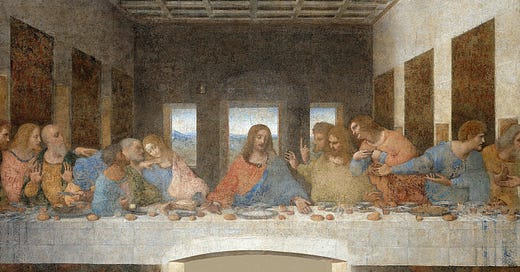On Sundays, we’ve been reading the Bread of Life Discourse from John, but as our daily readings proceed, we skip an interesting bit from Matthew.
In Mt 16:5-12, Jesus compares the Pharisees and Sadducees to leaven. The Apostles mistakenly believe He’s talking about actual bread. So He reminds them of the feeding of the five thousand and the feeding of the fourth thousand, then explains He’s speaking metaphorically, not literally.
The story tells us two things. First, it confirms the feeding of the multitudes happened more than once. Second, and more important, it demonstrates that Jesus will clarify metaphorical speech; in particular, with regard to bread.
From this we can conclude, when Jesus declares that we must eat His flesh, and many of his followers left,1 He would have clarified that he was speaking metaphorically… if it was a metaphor. But it’s not. He offered His body and blood at the Last Supper, and we continue to make that sacrifice at every mass.
Speaking of the Last Supper, Father Mike has some thoughts…
Reading 1
Jer 31:31-34
The days are coming, says the LORD, when I will make a new covenant with the house of Israel and the house of Judah. It will not be like the covenant I made with their fathers: the day I took them by the hand to lead them forth from the land of Egypt; for they broke my covenant, and I had to show myself their master, says the LORD. But this is the covenant that I will make with the house of Israel after those days, says the LORD. I will place my law within them, and write it upon their hearts; I will be their God, and they shall be my people. No longer will they have need to teach their friends and relatives how to know the LORD. All, from least to greatest, shall know me, says the LORD, for I will forgive their evildoing and remember their sin no more.
Jeremiah prophesied that there will be a “new covenant.” Jesus refers to this prophesy at the Last Supper,2 and we continue to recall it at every mass during the consecration. It’s no longer about simple obedience, but a right relationship with our creator.
Responsorial Psalm
Ps 51:12-13, 14-15, 18-19
R. (12a) Create a clean heart in me, O God.
A clean heart create for me, O God,
and a steadfast spirit renew within me.
Cast me not out from your presence,
and your Holy Spirit take not from me.
R. Create a clean heart in me, O God.
Give me back the joy of your salvation,
and a willing spirit sustain in me.
I will teach transgressors your ways,
and sinners shall return to you.
R. Create a clean heart in me, O God.
For you are not pleased with sacrifices;
should I offer a burnt offering, you would not accept it.
My sacrifice, O God, is a contrite spirit;
a heart contrite and humbled, O God, you will not spurn.
R. Create a clean heart in me, O God.
The psalmist is praying for the kind of relationship Jeremiah was talking about in the first reading. God doesn’t want us to be slaves who simply obey the law. He wants us to give our whole hearts to Him, in everything we do. Love guides us towards God, because God is love.
Alleluia
Mt 16:18
R. Alleluia, alleluia.
You are Peter, and upon this rock I will build my Church,
and the gates of the netherworld shall not prevail against it.
R. Alleluia, alleluia.
Gospel
Mt 16:13-23
Jesus went into the region of Caesarea Philippi and he asked his disciples, "Who do people say that the Son of Man is?"
They replied, "Some say John the Baptist, others Elijah, still others Jeremiah or one of the prophets."
He said to them, "But who do you say that I am?"
Simon Peter said in reply, "You are the Christ, the Son of the living God."
Jesus said to him in reply, "Blessed are you, Simon son of Jonah. For flesh and blood has not revealed this to you, but my heavenly Father. And so I say to you, you are Peter, and upon this rock I will build my Church, and the gates of the netherworld shall not prevail against it. I will give you the keys to the Kingdom of heaven. Whatever you bind on earth shall be bound in heaven; and whatever you loose on earth shall be loosed in heaven." Then he strictly ordered his disciples to tell no one that he was the Christ.
From that time on, Jesus began to show his disciples that he must go to Jerusalem and suffer greatly from the elders, the chief priests, and the scribes, and be killed and on the third day be raised. Then Peter took Jesus aside and began to rebuke him, "God forbid, Lord! No such thing shall ever happen to you."
He turned and said to Peter, "Get behind me, Satan! You are an obstacle to me. You are thinking not as God does, but as human beings do."
Within just a few verses, Jesus calls Peter the rock on which He’ll build His church (i.e. the pope), and then calls him Satan. But it would be a mistake to think Jesus is capricious. Peter is like all of us—inclined both towards good and evil.
That’s why we need a new covenant, written on our hearts. Like today’s psalm, we must pray for clean hearts, to receive Jesus grace, both in our every day lives and the special occasions where we participate in Jesus’ great sacrifice in the mass.
We’ll see this in a couple weeks in John.




